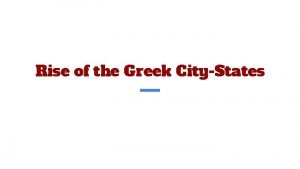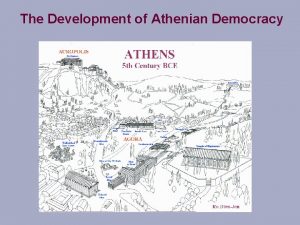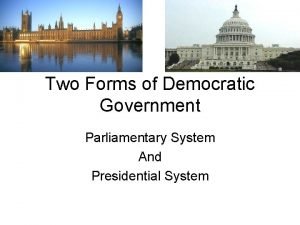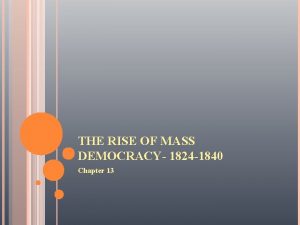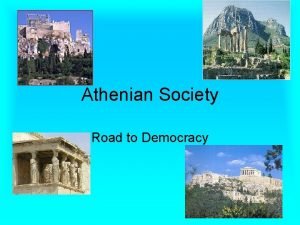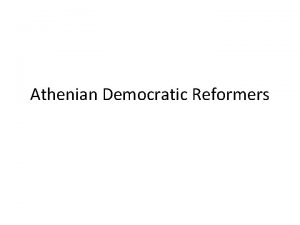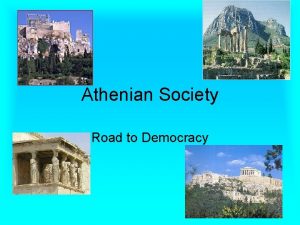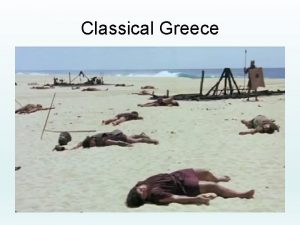The Rise of CityStates Athenian Democracy I Greece










- Slides: 10

The Rise of City-States & Athenian Democracy I Greece

The Rise of City-States • 750 BCE: The Polis: – City and surrounding countryside on an acropolis (fortified hilltop). – Monarchy, aristocracy, oligarchy. – Defended by citizens.

Sparta v. Athens • Military. • Assembly and Council of Elders. • Citizens, non-citizens, helots (peasants), slaves. • Military training. • Women mange estates. • Democratic. • Free, adult, male citizens. • Citizens, women, foreigners, slaves. • Solon vs. Draco. • Trade, education. • Women raise children.

The Structure of Athenian Democracy in the Fifth Century Assembly (or Ekklesia)--(All adult male Athenian citizens; quorum = 6000; main governing body of the Athenian democracy, which oversaw and was supplemented by the following) Council (or Boulê) Administration Court System Sets agenda for Assembly. Chosen by lot for one-year term 50 from each of the 10 tribes. No one could serve more than two times during his life, and terms could not be successive. Board of Ten Generals (elected) Eliaia-panel of 6000 jurors selected by lot annually. Juries for each case also selected by lot. Juries could have 200 -2000 members. Prytaneum (Executive committee of Council) The representatives from each tribe constituted the prytaneum by turns through the year (i. e. , about 36 days for each tribal contingent). City Architect (elected) Areopagus (Court for murder cases -see Aeschylus's Oresteia) Numerous Boards (typically 10 members, chosen by lot for 1 -year terms) Nine archons (chosen by lot for 1 tear terms) Priests and Sacred Treasurers (could be hereditary, chosen by election or by lot for terms of one year to life)

Roots of Democracy • • Why do we have government? Rich vs. poor. Education, culture. Avoid war.


Draco and Democracy • Clashes between aristocrats and common people. • 621 BCE: Greek lawmaker Draco writes first legal code: – Contracts and property. – Unfair practices – debt slavery. – "And Draco himself, they say, being asked why he made death the penalty for most offences, replied that in his opinion the lesser ones deserved it, and for the greater ones no heavier penalty could be found. " Plutarch Life of Solon

Solon and Democracy • 594 BCE: Solon chosen to head government. – Outlaws debt slavery. – Universal suffrage. – Right to bring charges against wrongdoers. • Legal reform, but political missteps.

Pisistratus and Democracy? • 546 BCE: First Athenian tyrant. • Uses economic and legal reform to buy support of the poor.

Cleisthenes and Democracy • 508 BCE: Reformer. • Reorganizes the assembly to break up the power of the nobility. • Citizens submit laws for passage and debate. • Council of 500: – Proposed laws and counseled the assembly.
 Socratic problem
Socratic problem Greek citystates
Greek citystates Development of athenian democracy
Development of athenian democracy Parliamentary system
Parliamentary system Chapter 13 the rise of a mass democracy
Chapter 13 the rise of a mass democracy Election of 1836 & rise of mass democracy
Election of 1836 & rise of mass democracy Chapter 13 the rise of a mass democracy
Chapter 13 the rise of a mass democracy Tricky dicky richard nixon
Tricky dicky richard nixon Rise again and again until lambs
Rise again and again until lambs A union b example
A union b example Rise and rise until lambs become lions
Rise and rise until lambs become lions
